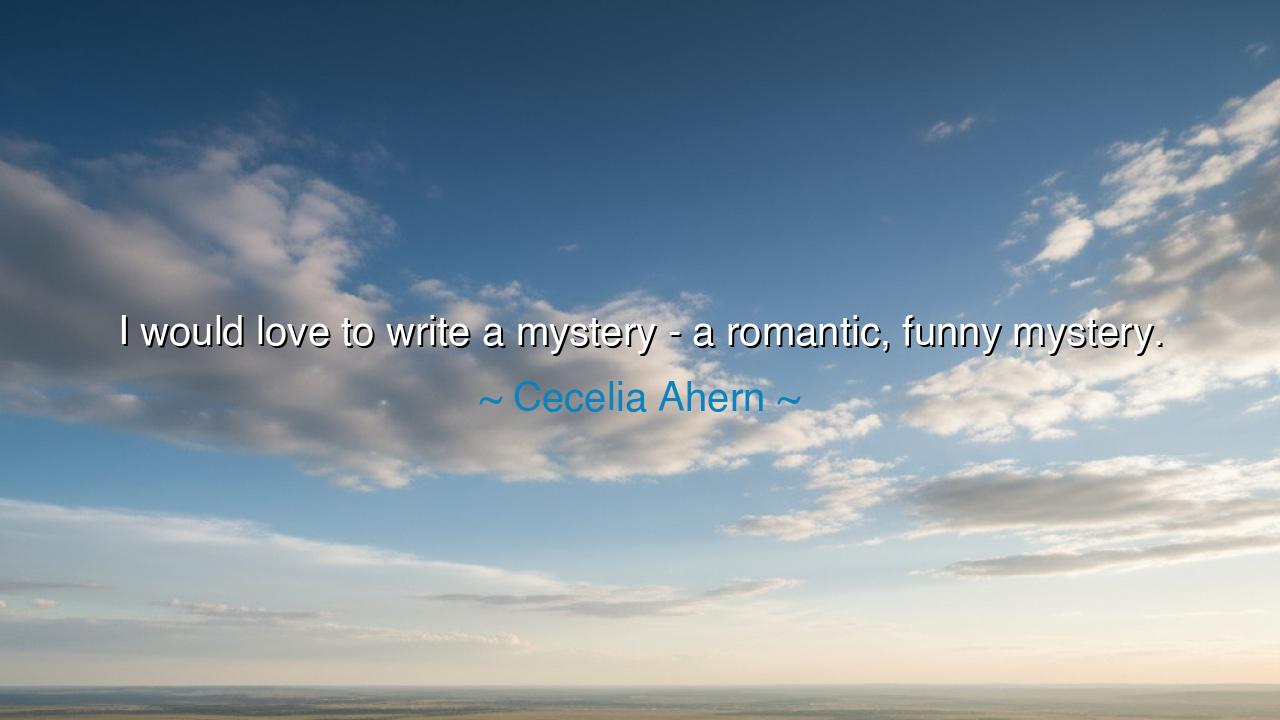
I would love to write a mystery - a romantic, funny mystery.






In the words of Cecelia Ahern, "I would love to write a mystery - a romantic, funny mystery," we encounter the essence of a timeless genre, one that blends the intrigue of the unknown with the lightness of humor and the depth of love. Ahern’s vision speaks to a noble truth about the power of storytelling: that the greatest tales are not those that focus solely on one aspect of the human experience—be it romance, humor, or mystery—but those that weave these elements together in a way that reflects the complexity of life itself. To write such a story is to explore how love and humor can intersect with intrigue, and how the pursuit of truth in the midst of uncertainty can also be a journey of personal growth and discovery.
The ancient world, too, understood the allure of mystery intertwined with romance and humor. In Greek drama, comedy and tragedy often coexisted, revealing the paradox of life itself. Aristophanes, the master of ancient comedy, frequently infused his plays with romantic themes, while also introducing mysteries that created both suspense and amusement. In Lysistrata, for example, the comedy stems not only from the absurdity of women withholding sex to end war, but also from the intricate, unpredictable dynamics of human nature—love, power, and humor all combine in a story that challenges and entertains in equal measure. The ancients understood that mystery, romance, and humor are not separate threads but part of the same human tapestry, each revealing something about the heart of life’s journey.
Consider also the myth of Persephone and Hades. Persephone’s abduction by Hades into the underworld is, in many ways, a mystery—an unfolding drama that reveals both love and conflict. This story carries elements of romance, as Persephone comes to develop a relationship with Hades, even though it began with force. Yet, there is also humor in the myth, as it represents the changing seasons and the cyclical nature of life, bringing a sense of balance between darkness and light. Here, as in the romantic mystery that Ahern envisions, there is no single answer, but a blend of contradictory forces that make the story rich, complex, and deeply human.
In Shakespeare’s work, we find a similar interweaving of romance, mystery, and comedy. In Twelfth Night, the romantic entanglements of Viola, Orsino, and Olivia are complicated by mistaken identities, disguises, and misunderstandings—elements that add both mystery and humor to the plot. Shakespeare understood that the best stories were those where love and confusion went hand in hand, with mystery offering the tension that kept the audience engaged while humor provided the relief. Like Ahern’s desire to create a romantic, funny mystery, Shakespeare demonstrated that mystery and romance are not contradictory but mutually enhancing. Their combination reveals the complexities of human nature: love is often a mystery, and humor the lens through which we can make sense of it.
The beauty of writing a romantic mystery, as Ahern suggests, lies in the ability to explore life’s contradictions. Love is often a mystery in itself. Relationships unfold with uncertainty, full of both clarity and confusion. Similarly, humor often arises from the mystery of human interactions—the way we misunderstand each other, or the way life surprises us with unexpected twists. When combined, these elements invite us to confront the unknown with a sense of curiosity and playfulness, qualities that make life both challenging and enjoyable. The best romantic mysteries are those that reflect the truth of human experience: love is unpredictable, people are complex, and sometimes, laughter is the best way to navigate the uncertainty.
Ahern’s desire to write a romantic, funny mystery also speaks to the importance of balance in storytelling. Much like the ancient poets, who understood that the most powerful narratives are those that incorporate a full range of emotions and themes, modern writers can create stories that reflect the complexity of real life. Life is not merely a romance or a mystery, nor is it only a comedy or a tragedy. It is all of these things woven together. Just as the ancients used their myths and plays to explore the intersections of human emotion, Ahern’s writing reflects the same pursuit: to create a story that is both light-hearted and thought-provoking, full of mystery, humor, and love, and to reveal the profound truths that lie within.
The lesson here is one of integration—to recognize that the richness of life comes from embracing its many complexities. We cannot live in a world that is only happy, nor can we face mystery and challenge without some sense of hope or romance. Ahern’s desire to write a romantic mystery invites us to explore how these forces exist not only in fiction but in our own lives. Embrace the mystery of love, the playfulness of humor, and the depth of your own relationships. Just as Shakespeare and the Greeks showed us, the beauty of life lies in the tension between these forces—mystery and romance, laughter and struggle. Through this balance, we can navigate the complexities of life and love with a deeper understanding and a more open heart.






AAdministratorAdministrator
Welcome, honored guests. Please leave a comment, we will respond soon